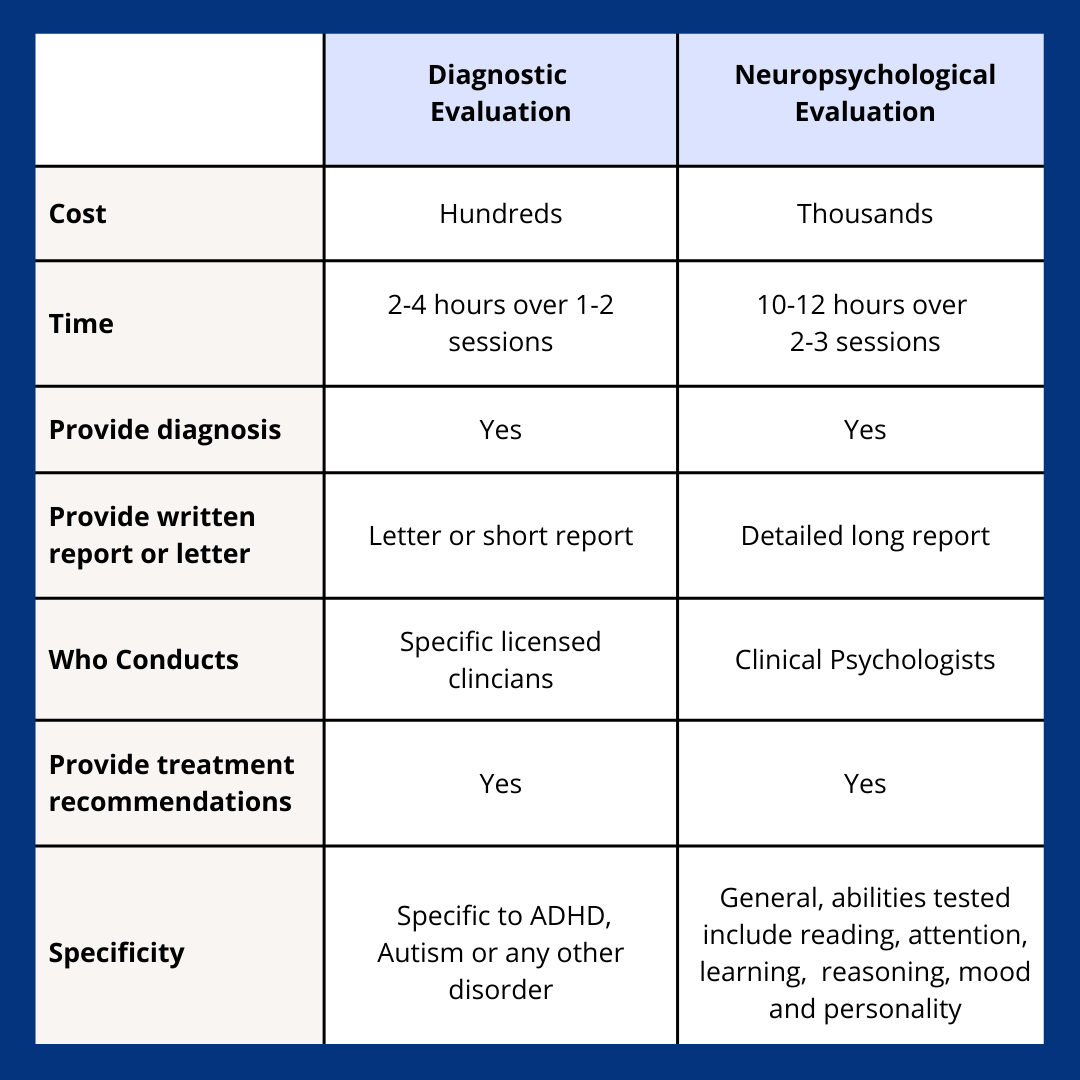Differences Between Neuropsychological Evaluations and Autism or ADHD Testing
Do I need a 12-hour, several thousand dollar Neuropsychological Evaluation to learn if I have ADHD or Autism?
Read on to learn about shorter, more affordable, specific and accurate ADHD and Autism diagnostic testing.
What’s the difference between a diagnostic evaluation and a neuropsychological evaluation?
We get this question all the time!
First things first, the names neuropsychological evaluation, neuropsychological assessment, and neuropsychological test all refer to the same test and are all interchangeable. Likewise diagnostic evaluation, diagnostic assessment, and diagnostic test all refer to the same test. But, a neuropsychological test is not the same as a diagnostic test.
While there is quite a bit of overlap there are also major differences between these two psychological evaluations.
What are the similarities between diagnostic evaluations and neuropsychological evaluations?
If you want to know if you have ADHD or Autism you can have either a neuropsychological evaluation or a diagnostic evaluation as both provide a diagnosis answer and treatment recommendations. They are both performed by mental health professionals. Both also provide documentation.
Now, what are the differences between diagnostic evaluations and neuropsychological evaluations?
The biggest differences are the cost, time it takes, specificity of the tests and who assesses the tests.
Neuropsychological evaluations take anywhere from ten to twelve hours and is usually completed over two or three sessions, while diagnostic evaluations take between two and four hours and are usually completed in one or two sessions. Both provide a diagnosis but a neuropsychological evaluation provides a long, detailed written report including information about the tests conducted. Usually a diagnostic evaluation provides a signed diagnosis letter, but some clinicians may also provide a written report. Mental health professionals with advanced understanding of certain conditions can provide diagnostic evaluations while neuropsychological evaluations are always conducted by clinical psychologists.
Another huge difference between these two psychological tests is the specificity of the test. Most diagnostic evaluations focus on a particular condition or set of conditions like ADHD or Autism, depression, and anxiety. Neuropsychological evaluations are much less specific and test for a wide range of conditions including reading, attention, intelligence, reasoning, and mood disorders.
Depending on why you are receiving the diagnosis will help you decide which one to pick.
Some reasons for obtaining the neuropsychological assessment include having other serious co-occurring mental health conditions, brain injuries, or if a neuropsychological assessment is being specifically asked for to obtain certain school accommodations. If you are interested in knowing if you have specific conditions including Autism, ADHD, depression, and/or anxiety you could benefit from receiving a diagnostic evaluation.
What are the benefits of receiving a diagnosis?
People seek out a diagnosis for many reasons. Some people find having a diagnosis comforting as it allows them to make sense of symptoms, behaviors and feelings. It may help shift a sense of self-blame. For example you may have been called “lazy” or “weird” throughout your life. By receiving a diagnosis of ADHD or Autism, you may be able to no longer blame yourself for behaviors, or internalize your differences as flaws.
Furthermore, having a diagnosis, or a name for what is happening, can mean that communication between various healthcare professionals, and the individual concerned, is smoother, more efficient and that the correct help is received. Having a diagnosis can give access to various support groups, specific treatment, accommodations at school or work, and medications that might not have been available previously.
Being labelled with a mental health diagnosis may also impact how others interact or perceive you. For example, having an autism diagnosis can help others not perceive you as “anti-social” and someone who is “blunt” or “rude” but rather someone who has communication differences. Rather than being the a lazy person who does not go to work, friends, family and co-workers might be more understanding if you are given a diagnosis of depression. Rather than being the hyperactive child who can’t sit still in class, having a diagnosis of Attention Deficit Hyperactivity Disorder (ADHD) might encourage teachers to be more patient with you or change their teaching methods slightly.


